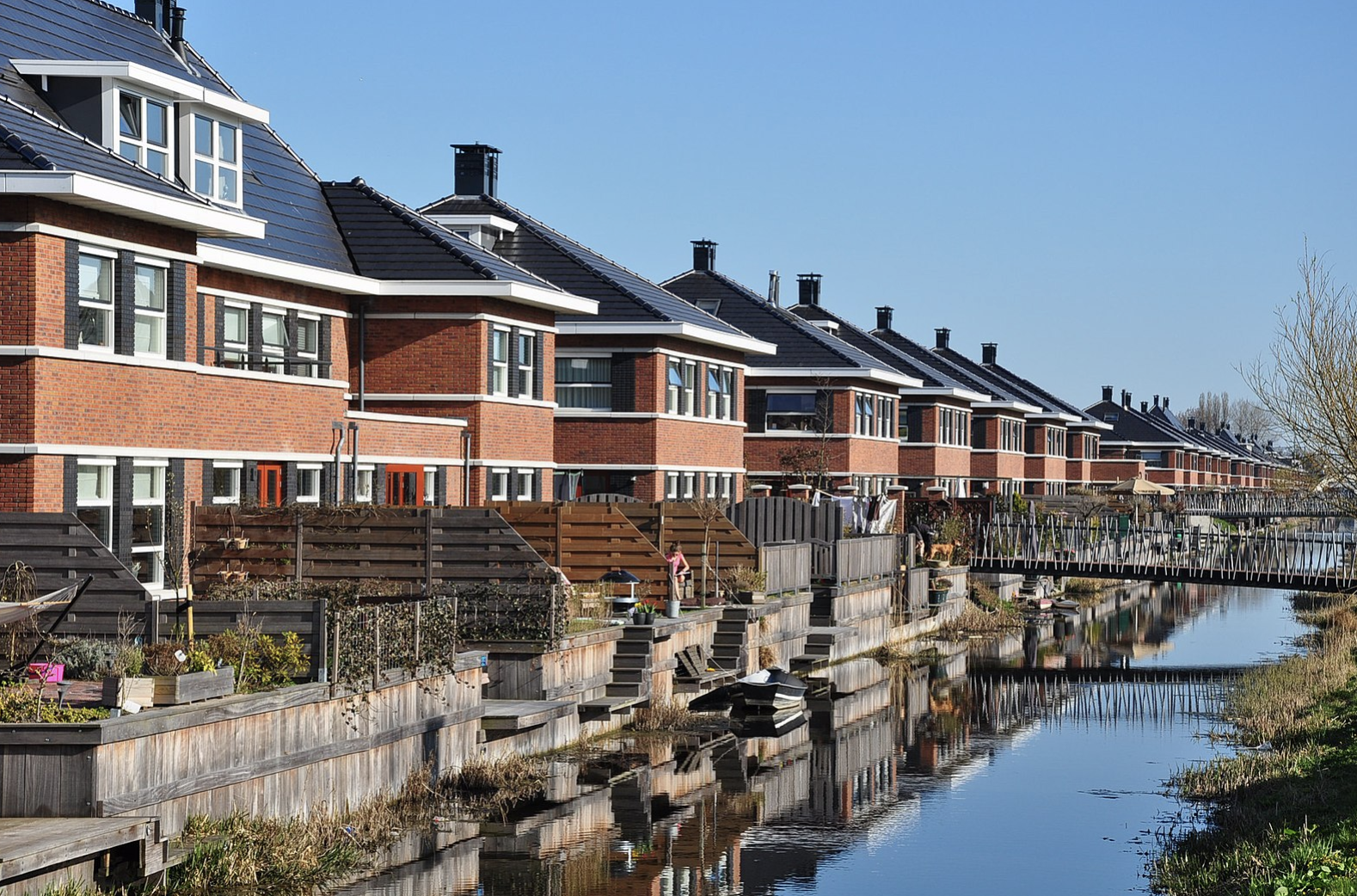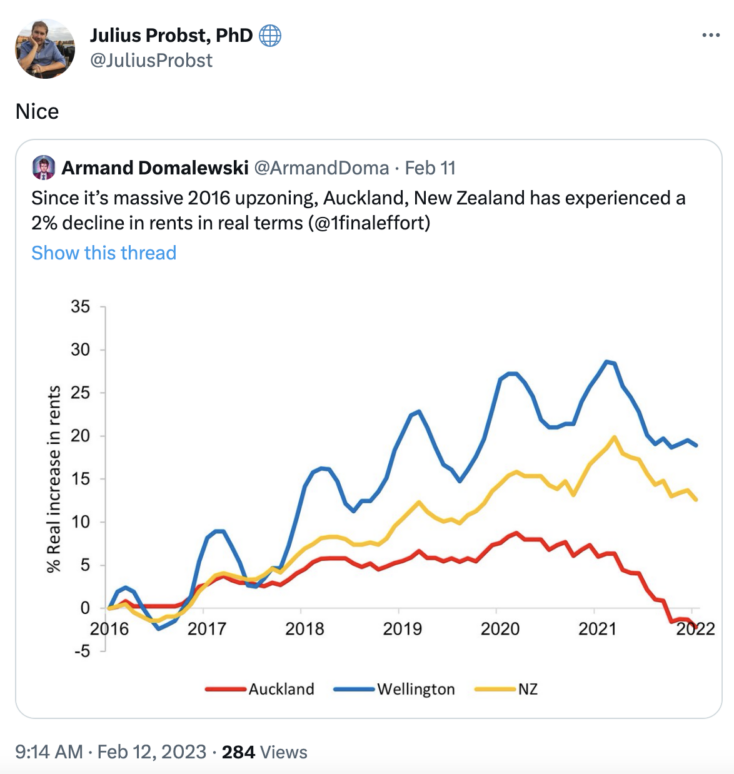
Law & Liberty has a very informative article on the housing shortage in the Netherlands. There’s a great deal of detail about things like “social housing”. I worry, however, that some readers might get lost in the weeds. So here I will provide a shorter version of not only this article, but any article on dysfunctional housing markets. But first a few comments on terminology:
There are two primary housing problems, shortages and excessive scarcity. A shortage occurs when quantity demanded exceeds quantity supplied at the current price. In contrast, excessive scarcity can occur even when markets are in equilibrium. It occurs when the price of housing is excessively high relative to the country’s level of development. In that case, people are able to purchase housing in the marketplace, but the price is so high they end up consuming less housing than one might expect given their income level.
Here are two key points to remember:
1. Housing shortages are caused by government price controls, which put a legal ceiling on rents at a level below market equilibrium. AFAIK, rent controls are always the cause of housing shortages.
2. Excessive housing scarcity is caused by government regulations and taxes that restrict building, or increase the cost of building. AFAIK, regulations (such as zoning) are always the cause of excessive housing scarcity (excessively high prices.)
So why can we be so confident in these two explanations of housing market problems? The key is the competitive nature of free markets in housing. Because there are many providers, we don’t have to worry about monopoly models of the housing market, or nefarious “speculators”. The supply and demand model works fine.
It is theoretically possible that there might be other causes of housing scarcity. For instance, the Netherlands is one of the world’s most densely populated countries. Perhaps Dutch housing is very expensive due to a shortage of land. In fact, the Netherlands has plenty of land for housing. Indeed this country is actually the world’s second largest exporter of agricultural products. The problem in the Netherlands is the same as the problem in California—rent controls and restrictions on the building of new housing. Even in ultra-dense Hong Kong, government controls on land substantially inflate property prices.
There’s no need to look further—it’s the government.
PS. Auckland, New Zealand recently changed their zoning laws to make it easier to build housing. This tweet discusses the effect:


READER COMMENTS
Jose Pablo
Feb 13 2023 at 5:11pm
“excessive scarcity (…) occurs when the price (…) is so high they (the people) end up consuming less housing than one might expect given their income level.”
This seems difficult to asses. If I understand it right, it means that the ratio #houses per capita per dollar of income is constant in different areas or, at least, has a “natural” value that can be work out from some other characteristics of the area.
Could you provide an example of an area with “excessive scarcity”? and an explanation on how we know that what is happening there is “excessive scarcity”(meaning less houses that expected given the income level of the area) and not just a high “healthy” housing price.
Kenneth Duda
Feb 13 2023 at 6:55pm
> Could you provide an example of an area with “excessive scarcity”?
How about: San Francisco, CA. Los Angeles, CA. Palo Alto, CA. etc.
> and an explanation on how we know that what is happening
> there is “excessive scarcity”(meaning less houses that
> expected given the income level of the area) and not just
> a high “healthy” housing price.
See:
https://www.zillow.com/homedetails/316-Ramona-St-Palo-Alto-CA-94301/19495546_zpid/
Modest three-bedroom home, less than 2000 sq ft, for $4M. $2000/square foot is not healthy. This is happening because Palo Alto and all other nearby localities refuse to permit high-density housing.
-Ken
Jose Pablo
Feb 13 2023 at 9:28pm
Kenneth, expensive houses shouldn’t be equal to “excessive scarcity”. Otherwise “excessive scarcity” would be just another name for “expensive houses”.
What is the #houses per capita per dollar of income in the counties you mention?
What is the value of the abovementioned ratio that we should “expect” in these areas? why?
Is the “expected ratio” above the actual one?
Scott Sumner
Feb 14 2023 at 8:06am
One would normally expect a well paid, highly productive worker to be able to afford a very nice house, not just a small ranch house built in the 1960s.
Yes, the market’s in equilibrium, but at a very disappointing level due to excess regulation.
Jose Pablo
Feb 14 2023 at 9:30am
Yes, the market’s in equilibrium, but at a very disappointing level due to excess regulation.
Yes, maybe. But how do we know how “disapointing” this equilibrium level is? I am always skepthical about “guessing the market wrong” (not to a lesser extent from reading your posts. Thank you).
In LA County, the number of households is 3,342,811 while in Dallas County it is 947,046.
The average number of persons per household in LA is 2.94 vs 2.72 en Dallas and the average income per capita in LA is 74,141 vs 72,218 en Dallas
So, yes, the ratio of house per capita per dollar of income is higher in Dallas 5.09 vs 4.59 but does just around a 10% difference, which does not seem like a big deal (if I am getting right this “level of excessive scarcity index”)
“a well paid, highly productive worker to be able to afford a very nice house,”
And yet, there are close to 10,000,000 people living in LA County, more than in any other county in the country. Somehow, even not so highly productive workers seems to be affording houses in LA
Scott Sumner
Feb 14 2023 at 12:04pm
“I am always skeptical about “guessing the market wrong””
If you think that’s what I’m doing, then you need to reread the post. I’m talking about dysfunctional regulations–not “the market”.
Jose Pablo
Feb 14 2023 at 2:17pm
Yes, Scott, I get that part.
I was, maybe, reading too much on your “One would normally expect a well paid, highly productive worker to be able to afford a very nice house,” which I undesrtood like markets, even “normally regulated ones” (all of them have some form of regulation) can be “wrong” if they dont allow “highly productive workers” to afford X, Y or Z.
I am pretty sure that even without any regulation most productive workers would be priced out of Beverly Hills.
Maybe regulations improve, a lot of new houses are built in LA County and prices remain high in the area (or, at least, higher than in other areas). Is not like if we knew the elasticity of housing demand in LA County, do we?
Scott Sumner
Feb 14 2023 at 7:34pm
Jose, So you don’t trust theory. And you don’t trust empirical evidence because . . . .”the market”. OK, what information do you trust?
Jose Pablo
Feb 14 2023 at 8:14pm
Scott, I do believe in (some) theories and much more in empirical evidence. And I do believe that regulation increases housing prices.
Which is not clear to me is to what extend: whether it is a major contribution compare with other factors.
I have seen significant (and fast) changes in prices in real state without changes in housing regulations (I know you never said, it was “only” regulation, and yet …)
I also think that if 10 million people leave in LA (empirical), it is because most of them (99%+) can afford the house they are living in (reality can definitely happen). I have stopped listening to arguments about housing that include the word “affordability”; in my opinion they hide more than they explain.
And I learned from you not to reason from a price change, so I am more curious about the evolution of the number of rental houses in Auckland, that about the evolution of rent prices. I could not find this figure, but the price graph in your post can have very different readings depending on how the volume has evolved.
Jose Pablo
Feb 14 2023 at 8:43pm
I found it! … pretty impressive effect.
https://www.brookings.edu/blog/the-avenue/2022/01/24/new-zealands-bipartisan-housing-reforms-offer-a-model-to-other-countries/
If I read it right, from 5k to 15k new permits in just 4 years (2016-2020)
The number of dwellings in Auckland is about 500,000. So, the new regulation allowed for a 4% increase in the number of units (20,000 more units that in the case with no regulation) for a decrease of 2% in prices (assuming all the 2020 permits were already in the market in 2022).
Interesting case Auckland, on the other hand, if 2% is the effect in 6 years of a “massive upzoning” … LA county is doomed for the foreseeable future …
ssumner
Feb 15 2023 at 7:57am
If LA house prices fell 2% over 6 years, while the rest of the US rose by 15%, I think potential LA residents would be thrilled.
In any case, if you build more housing, then people have . . . more housing. Right?
robc
Feb 14 2023 at 8:40am
There is a simple test…is the equilibrium at a lower quantity than it would be without regulation?
Jose Pablo
Feb 14 2023 at 9:02am
Counterfactuals are never “easy” Robc
robc
Feb 14 2023 at 9:30am
I said “simple”, not “easy”.
It is a simple test. It may also be a hard test.
And like e e cummings, my online persona isn’t capitalized.
Jose Pablo
Feb 14 2023 at 10:41am
Counterfactuals are never “simple” , robc
Richard W Fulmer
Feb 13 2023 at 5:39pm
The Dutch government subsidizes housing in ways other than rent control, including tax incentives and subsidies. Arnold Kling’s observation that government market intervention tends to encourage demand and discourage supply apparently isn’t limited to just the United States.
seer of things
Feb 16 2023 at 5:32am
Valuable observations, as usual. Defining terms is super valuable. Is there value in the distinction between “shortage” and “excessive scarcity”? What is the harm if I say something like “failure to increase the residential building height limit in this area resulted in a shortage”. That’s wrong by your definitions but perhaps harmless?
Jose Pablo
Feb 16 2023 at 3:07pm
“Shortage” is a very serious real situation: you go to your local market to buy wine and there is no wine for you at any price (so you feel miserable).
“Excessive scarcity” is a “concept”: there is less wine in your local market that the amount that “should” be demanded given the income level of your neighborhood. You think it is because the price is “too high” (lots of subjectivity at play here an, at the end, you are pissed off, but still manage to be tipsy)
Somehow is kind of the difference between the actual unemployment rate (very real and harmful) and NAIRU (a “concept” you cannot directly observe or measure)
Jonathan Monroe
Feb 20 2023 at 9:00am
The traditional English word for high market-clearing prices with obviously negative social consequences is “dearth” – as in “things are dear”.
The question of whether dearths were more likely to be caused by supply shocks or by excessive monetary expansion was a live topic of debate among scholars of political economy as early as the Mid-Tudor crisis in 1550’s England.
Comments are closed.